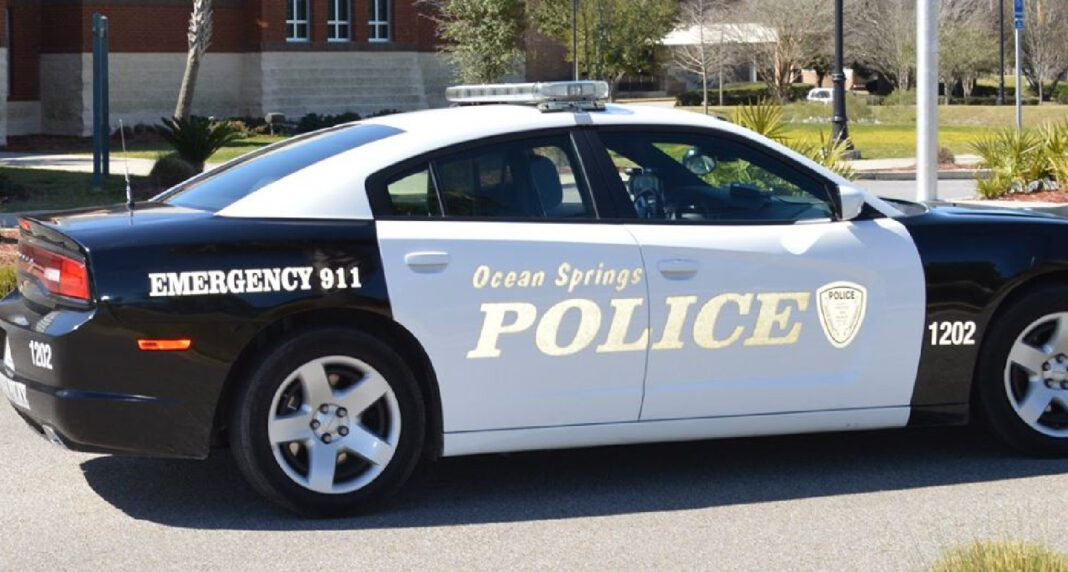MISSISSIPPI GULF COAST — A shoplifting suspect led police on a high-speed chase spanning three cities on the Mississippi Gulf Coast Thursday, ending in a collision in Ocean Springs. The pursuit wasn’t for a dangerous criminal or a violent offender — it was for a suspected shoplifter, raising serious questions about the risks law enforcement is willing to take over minor theft.
The incident began when an unidentified suspect allegedly shoplifted from a Lowe’s store in D’Iberville.
D’Iberville police initiated the chase, which continued through Biloxi and culminated in Ocean Springs. The suspect, driving a dark gray Ford Fusion, collided with a truck towing a trailer near Perryman Road on Government Street. After attempting to flee on foot, he was apprehended near Ridgeview Drive and transported to a hospital with minor injuries. No other injuries were reported. The suspect faces multiple charges, including shoplifting in D’Iberville and felony eluding in Biloxi, with additional charges anticipated in Ocean Springs.
The incident shines a light on the inherent dangers of high-speed police pursuits, particularly when initiated for non-violent offenses like shoplifting. Nationally, police chases result in significant numbers of injuries and fatalities each year. A comprehensive investigation by the San Francisco Chronicle revealed that from 2017 through 2022, at least 3,336 people were killed in police vehicle pursuits across the United States. Notably, a substantial portion of these fatalities were innocent bystanders.
In response to these concerns, several cities and states have implemented stricter regulations governing police pursuits. For instance, Chicago has explicitly prohibited police from engaging in pursuits for theft or traffic offenses, aiming to reduce the potential for harm to the public.
Similarly, Atlanta limits chases to suspects involved in murders and certain violent crimes, reflecting a trend toward more restrictive pursuit policies.
These policy changes are informed by studies and recommendations from law enforcement organizations. The Police Executive Research Forum, a national think tank on policing standards, has advocated for limiting police pursuits to situations involving violent crimes where the suspect poses an imminent threat. This recommendation aims to curb the hundreds of deaths caused by police chases in the U.S. each year.
Local Reactions to the Chase
The high-speed pursuit has sparked heated debate among residents, with many weighing in on social media. Opinions ranged from full support of police actions to strong criticism of the risks posed to public safety over a minor crime.
Chuck Cole defended the chase, arguing that it deters others from committing similar crimes. “Yes. Sends a message to the other dirtbags. I’m sorry that it ended in an injury but instead of blaming the police how bout we lay the blame at the feet of the criminal… Enough of this woke bull$hit and stop making those bad players a victim and giving them a pass for bad behavior,” he wrote.
Some residents focused on the broader implications of letting a shoplifter go. Larry Petty suggested that while police shouldn’t always pursue, allowing shoplifters to escape could have long-term consequences. “I don’t think they should, but I know if the shop lifter gets away and isn’t caught, that emboldens them to keep doing it,” he said.
Others emphasized the risks involved. David Zwick highlighted the need for police to assess each situation carefully, writing, “I reckon it depends on the circumstances. It has to be a judgment call. If it’s putting civilians at danger…yes, the police probably should back off.”
On the more hardline side of the debate, many residents supported police actions, arguing that lawbreakers should be pursued regardless of the offense. Larry D. Hammonds declared, “Crime is crime! Zero tolerance!” Similarly, Charles Hawkins wrote, “Lives are being risked every day just driving on Highway 90 and there are wrecks every day. Yes chase them, they broke the law.” Daniel Bullock added, “Hell yeah, chase them, you have no idea what else they may have done or what else they may have with them.”
Not everyone agreed. Debbie Parker and Randy Johnson questioned the necessity of a chase for shoplifting. Parker suggested alternative methods, writing, “It’s still a crime. However, a high-speed chase may not be necessary. They have the tag #.” Johnson stated simply, “Not for shoplifting!”
The polarized responses highlight the ongoing tension between enforcing the law and ensuring public safety, underscoring the complex decisions law enforcement must make during pursuits.
The pursuit on the Mississippi Gulf Coast raises important questions about the balance between apprehending suspects and ensuring public safety. As more jurisdictions reconsider their pursuit policies, the goal remains to protect both law enforcement officers and the communities they serve from the potential dangers of high-speed chases.


